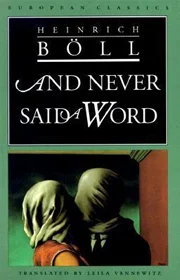
“And Never Said a Word” by Heinrich Böll follows the story of Ludwig, a young man returning to post-World War II Germany after being a prisoner of war. Struggling with the psychological wounds of his wartime experiences, Ludwig finds it difficult to communicate and reintegrate into society. The novella delves into the challenges of post-war trauma, depicting the breakdown of communication and the inner struggles faced by individuals trying to rebuild their lives. Böll’s narrative provides a poignant exploration of the human condition and the lasting impact of war on the individual psyche.
Read And Never Said a Word Flipbook:
Listen to And Never Said a Word Audiobook:
Title: And Never Said a Word
Author: Heinrich Böll, a German writer and Nobel laureate.
Genre: Literary fiction.
Publication Date: The novella was first published in 1953.
Setting: The story is set in post-World War II Germany.
Plot Summary: The novella follows the life of a young man named Ludwig, who returns home after being a prisoner of war. He struggles to communicate and integrate back into society, haunted by his wartime experiences.
Themes:
• Post-War Trauma: The book explores the psychological impact of war on individuals and their ability to reintegrate into society.
• Communication Breakdown: Ludwig’s inability to express himself becomes a central theme, reflecting the challenges of communication in a post-war environment.
Characterization: The characters, especially Ludwig, are portrayed with depth, highlighting the complexities of human emotions and experiences.
Narrative Style: Böll’s narrative style is introspective, delving into the inner thoughts and struggles of the characters.
Social Commentary: The novella serves as a commentary on the aftermath of war, addressing the societal changes and the difficulties faced by individuals trying to rebuild their lives.
Legacy: Heinrich Böll’s “And Never Said a Word” is considered a poignant exploration of the human condition and the scars left by war, contributing to Böll’s reputation as a prominent post-war German author.